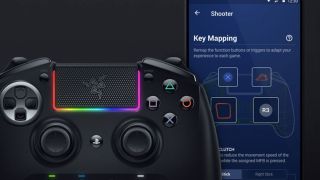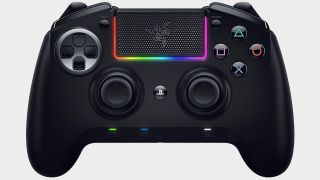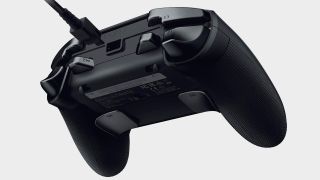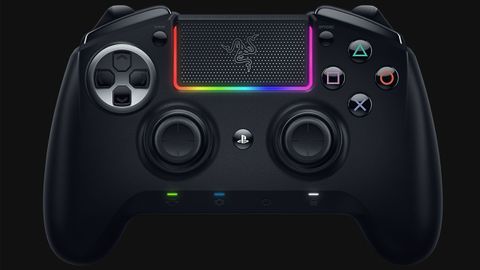12DOVE Verdict
A decent option for pro and eSports players, but doesn't offer decent gameplay improvements for everyday players. And it's super expensive.
Pros
- +
Great build-quality
- +
Very customizable
- +
Minimal finger travel-time
Cons
- -
Expensive
- -
Too easy to hit M buttons by mistake
Why you can trust 12DOVE
How do you improve on controller perfection to give players an edge? That’s the tricky question Razer Raiju Ultimate finds itself needing to answer when appealing to the PS4 crowd. This is because, from a pure comfort perspective, most PS4 players would agree that Sony nailed it with the design of the DualShock 4. Whereas the leap from the PS2 analogue controller to the PS3’s left a lot to be desired in terms of iteration, for the current generation, PlayStation’s handset feels satisfying to hold and easy to use. The addition of a massive touchpad that operates as a big button in the centre isn’t as annoying as sceptics initially thought, either.
The Razer Raiju Ultimate maintains these technical strides for the most part, seeking to improve upon them by way of increased customisation, multi-functional buttons, and interchangeable D-pad and thumbsticks – all factors that are useful to the dedicated eSports player craving an edge the next time they step into Call of Duty.
For the average gamer, however, the increased number of options will likely serve as a complication, at risk of getting in the way of your next wistful outing in games like Red Dead Redemption 2 and God of War where the quickest reaction times aren’t necessarily required.
Features

Works with: PS4, PC
Buttons: Two back paddles, two bonus multi-function shoulder buttons, trigger stops, Mecha-Tactile face buttons
Customizable: Yes (d-pad and thumbsticks)
Connectivity: Bluetooth, wired (braided micro-USB fiber cable)
Battery life: Up to 11 hours
While largely pitched as a PS4 controller alternative, everything the Razer Raiju Ultimate brings to Sony’s console is also offered up on PC thanks to dual-compatibility. There are three play options that can be set via a switcher located on the backplate: wireless PS4; wireless PC, and wired with either two. There was no noticeable delay or lag between the three in any of my extended play sessions, and following a four-hour charge, the Bluetooth connection continued to hold strong.
In more practical terms Razer Raiju Ultimate is pitched primarily as an eSports controller, so there are few quirks particular geared towards that. One is what Razer calls ‘trigger top switches’, which allows players to determine the distance needed to activate the all-important L2 and R2 triggers. The idea is that by hitting them with a simple click, rather than letting them insert all the way in, your response time to shoot or aim is significantly increased. We’re talking milliseconds of difference by this point, but that’s the kind of precision levels needed to potentially boost the likes of your Victory Royale win rate in Fortnite.
Then there are the interchangeable thumbstick types: two standard modules, one raised, and one smooth. Competitive players will no doubt want to swap out the right stick for the raised module, if only to increase sensitivity of precision far beyond what most first-person shooters offer in-game. The alternative D-pad will have more to offer the average player, featuring a single tile as opposed to individual directional modules – making it easier to play games like racers and fighting games, which work better when rolling your thumb over an arrow. In this regard, Razer Raiju Ultimate improves the play experience for certain genres on PS4 over and above what the DualShock 4 can offer (or the cheaper Razer Raiju Tournament Edition, for that matter).
Design
Aesthetically, Razer Raiju Ultimate makes a great first impression when taking it out of the box. Packaged in its own hard-shell carry case complete with compartments designed to safely store the D-pad, USB to Micro-USB cable, and thumbsticks you’re not using, everything about Razer Raiju Ultimate screams ‘boutique’ and ‘premier’. Expected, considering its $170 price tag. Onto the controller itself and the ergonomic shape is more akin to that of a standard Xbox One controller than a DualShock 4. Before you start worrying about the woes of non-symmetrical thumbsticks, however, know that Razer Raiju Ultimate keeps them central. Overall, there’s a satisfying weightiness that comes as a result of the controller’s fatter design.

Other than the added customisation offered by interchangeable thumbsticks and D-pad, Razer Raiju Ultimate slaps on four additional buttons to areas where your fingers would typical fall to rest. Dubbed M1, M2, M3, M4, the former two are located a little further inward than the L2 and R2 triggers, while the latter are at times all-too easily pressed due to their location at the back. To round out the key design points there’s some snazzy (if pointless) chroma lighting bordering the central touchpad, and matted texture applied to the grip either side ensures players can always maintain a handle on things.
Performance
So how does Razer Raiju Ultimate actually feel to use? Good and bad. The main hang-up, as alluded to earlier, comes from where the M3 and M4 buttons are located. At the back, they’re simply too easy to press by mistake, particularly whenever a click of L3 or R3 is required. Many times while riding across the desert in Red Dead I found myself accidentally getting off my horse instead of praising it or switching between cinematic modes. It’s a little nit-picky, but then so is Razer Raiju Ultimate in how it functions. The problem is easily resolved by mapping M3 and M4 to no other input whatsoever in Razer’s app, but it’s another hoop that most PS4 players will be annoyed jumping through, and you're actually nerfing one of the features you paid top-dollar for.

In stark contrast, Razer Raiju Ultimate’s M1 and M2 shoulder buttons (inward of L2 and R2) are a breeze to click in, but it’s to the detriment of L1 and R1. I mentioned earlier that Razer Raiju Ultimate has a lot in common with an Xbox One controller, and unfortunately as well as the nice heft and good grip, this also translates to a spongier and less tactile L1 and R1. It may only apply to those with large hands, but my index fingers never rested naturally on them. Because of this M1 and M2 were my referred replacements, but that’s solving an issue that wasn’t ever there in the first place.
Outside of this, the press of every other button feels satisfying – largely due to the Razer Raiju Ultimate’s clicky feedback. Even the centre touchpad feels good to tap, with it never being in doubt whether my presses registered ether in wired or wireless modes. The answer was always ‘you bet!’ Not having to press L2 and R2 as far down was also consistently responsive, and is a small feature almost every PS4 player will enjoy and be satisfied by. But it's small gains.
Razer Raiju Ultimate does a lot of things right to appeal to the specialist and eSports PS4 players. To those who prefer single-player or story-driven experiences, however? Not so much. Given the $170 price attached, it’s nice that the controller provides a great sense of quality thanks to a good heft, textured, grip, and reliable button inputs, but the addition of M3 and M4 and how easy it is to accidentally push them seems like a design oversight. Critically, there simply isn't enough benefit here to justify the premium price. The DualShock 4 remains the best option for the majority of PS4 players, while FPS devotees may find some value in boosting their response time.
Interested in all things Razer? Be sure to check out our guides to Razer headsets, Razer laptops, Razer keyboards, and the best Razer mouse you can get (not to mention our top picks for the best Razer streaming gear).
- Want to get the official PS4 controller cheap? Our guide has you covered
Aaron is a freelance writer who appreciates a good video game story just as much as great visuals and gameplay. Having covered the subject for places like WIRED, Den of Geek, PLAY Magazine, NME, PC Gamer and more, he’s well equipped to discuss a range of topics and industry goings-on through in-depth features, developer interviews and thoughtful reviews. His favourite game ever is 2005’s TimeSplitters: Future Perfect, a madcap character shooter from the makers of GoldenEye 007 that he first played whilst on holiday in Butlin’s Minehead. Because who needs to have fun in the sun, anyway?

Fallout: New Vegas director knew the Fallout 3 comparisons and bug complaints were coming, but knew that what made his RPG special were the things that you couldn’t find in one playthrough
Thanks to a big character change in Arcane season 2, I have a wild theory that might answer one of the Netflix show's earliest mysteries
Here are Netflix's Top 10 TV shows right now – and the 3 you need to stream
Most Popular



